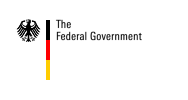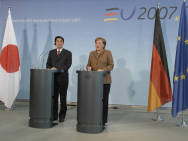Merkel noted that the close and friendly ties that exist between Germany and Japan are to be expanded to the level of a strategic partnership. At her suggestion Japan is to be the official partner country at the Hanover Industrial Fair in 2008.
Both sides want to use institutions such as the Japanese-German Center in Berlin as a source of impetus for the continued development of mutual relations. Prime Minister Abe referred to the existence of comparable problems in the two societies, citing a similar demographic trend as one example.
They indicated that neither Germany nor Japan are currently in favor of lifting the EU embargo on arms exports to China.
Joint responsibility in the G8
Japan is in line to take over the Presidency of the G8 from Germany in 2008. Merkel and Abe reaffirmed their intention to engage in close consultations in the G8 context based on shared values and similar objectives.
The German G8 Presidency will be focusing strongly on the protection of intellectual property. It will also be calling for greater transparency with regard to international financing instruments and a reduction of imbalances in the world economy.
Advancing UN reform
Merkel and Abe expressed strong support for a renewed attempt to move forward on United Nations reform. Merkel noted that the objective is reform of the organization as a whole and not just permanent seats on the Security Council for Germany and Japan. She said their reform efforts are not directed against other countries, adding that the two governments will seek to achieve a broad consensus in support of their objectives.
Resolving disputes with North Korea and Iran diplomatically
Both sides underscored the need to move forward towards a diplomatic solution in the Six-Party Talks on North Korea. They agreed that neither Asia nor Europe can have any interest in seeing North Korea armed with nuclear weapons.
With regard to Iran they noted that the international community needs to act as a united front on the basis of a mutually agreed position.
There is a lively interchange between Germany and Japan at the economic, political, and cultural levels. Japan is Germany’s most important trading partner in Asia after China. The two countries have similar interests as the world’s second and third largest economies.
Japan is an increasingly important political partner for Germany, actively engaging in mutual discussions of global and regional issues such as Afghanistan and UN reform.
The "Germany in Japan" campaign (2005/2006), with more than 1,500 events last year, resulted in a considerable strengthening of cultural relations. Germany and Japan are able to fall back on a number of institutions, such as the Japanese-German Center in Berlin, that promote cultural exchange between the two countries.

